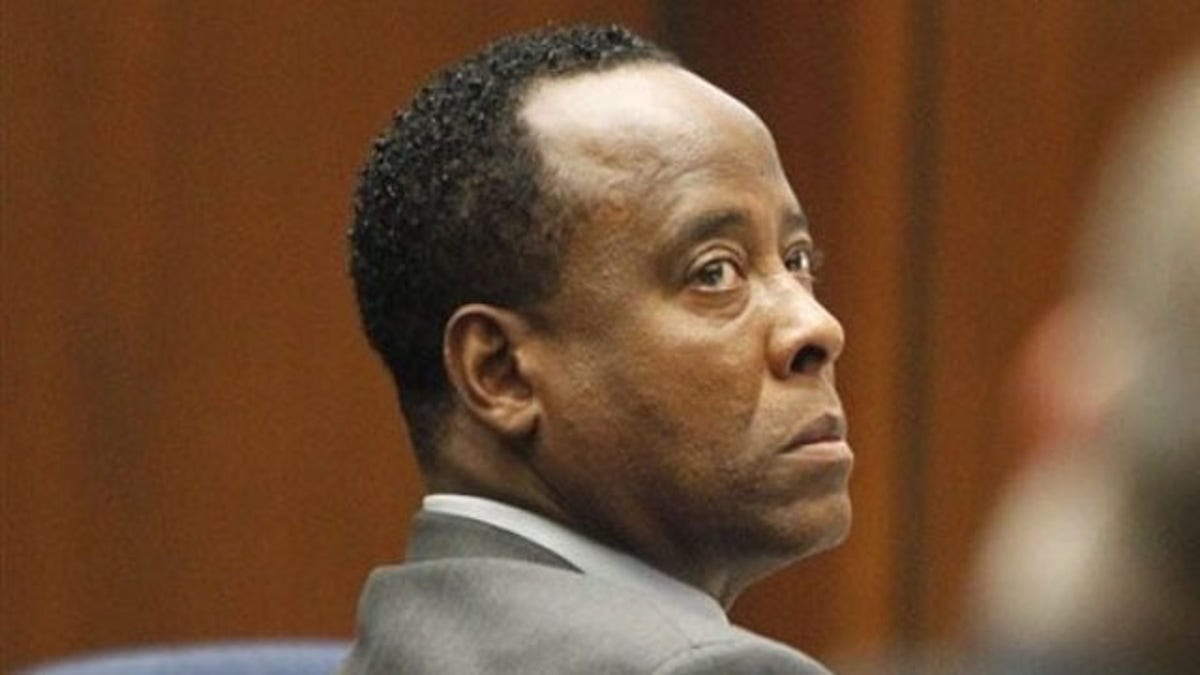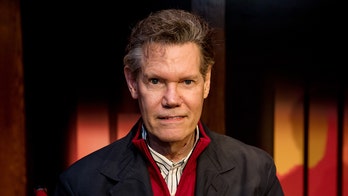
Sept. 28: Conrad Murray watches the court proceeding on the second day of his involuntary manslaughter trial in the death of pop star Michael Jackson in downtown Los Angeles. (AP)
An anesthesia expert testifying for the doctor charged in Michael Jackson's death on Friday challenged the prosecution's theories about the events leading up to the singer's death, stating he believes that Jackson gave himself the fatal injection of propofol.
Dr. Paul White says he doesn't see evidence supporting the prosecution theory that Jackson's doctor was infusing the singer with propofol using an IV. He says the theory isn't supported by evidence found at the scene or in Dr. Conrad Murray's statement to police.
White says the evidence recovered in Jackson's bedroom was more consistent with him receiving the anesthetic through an injection.
A prosecution expert had told jurors he believed Jackson's doctor used an IV drip of propofol and said that was the only way to explain the high levels of the drug found in the singer's body.
White spent much of his early testimony challenging a prosecution expert's estimation of how much of the sedative lorazepam Jackson received.
The drug, along with another sedative, was cited as a contributing factor in Jackson's June 2009 death, which was blamed on propofol intoxication. White is an expert in the anesthetic propofol and is expected to be the final defense witness.
Dr. Conrad Murray has acknowledged he was giving the singer propofol as a sleep aid.
White showed jurors a model he helped create that contends Jackson took some oral lorazepam in addition to an injection of the medication that Murray acknowledged giving the singer. In opening statements, Murray's attorneys claimed Jackson may have taken several lorazepam pills without his doctor's knowledge.
White's testimony disputes a theory presented by prosecution expert Dr. Steven Shafer that Jackson would have had to receive several injections of the sedative to reach the level of lorazepam found in his blood after his death.
White has not yet challenged Shafer's theory that Murray must have given Jackson more propofol than he acknowledged in an interview with police two days after the singer's death.
White's testimony will likely be vigorously challenged by prosecutors, who spent four weeks laying out their case that Murray is a greedy, inept and reckless doctor who was giving Jackson propofol as a sleep aid in the singer's bedroom.
The anesthetic is not intended as a sleep aid and, medical groups say, should be administered only in a hospital or surgical setting with advanced monitoring equipment.
Cross-examination of White will be delayed until Monday to give prosecutors more time to review a new analysis prepared by the defense based on recently conducted tests of samples taken during Jackson's autopsy.
The judge hearing the case, which ends its fifth week Friday, reluctantly agreed to delay the cross examination and said he is concerned about losing jurors. Superior Court Judge Michael Pastor, however, noted the panel has remained rapt throughout the trial.
"Every single member of that jury and all the alternates are paying extraordinary attention to every witness," Pastor said.
Murray has pleaded not guilty to involuntary manslaughter.
White will likely challenge Shafer's theory that the only scenario he believes explains Jackson's death is that Murray placed Jackson on an IV drip and left the room after he thought the singer was sleeping peacefully.
Murray told police he left Jackson's bedside but claims he gave the singer only a small dose of propofol the morning of Jackson's death. He said he left the room and returned after two minutes to find the pop superstar unresponsive.
Murray's defense attorneys have repeatedly claimed that Jackson somehow gave himself the fatal dose, but left it up to White to explain how that was possible.
White is a retired researcher and professor who performed clinical studies of propofol for years before it was approved for usage by the Food and Drug Administration in 1989. He said he was initially reluctant to become involved in the case, but after reading through more than a dozen expert reports, he couldn't figure out how others came to the conclusion that Murray would have had to leave Jackson on a propofol IV drip for the singer to have died with the anesthetic still coursing through his body.
He said the others' theories didn't make sense based on Murray's statement to police.
"I thought that there were questions if in fact Murray had administered the drugs that he described in his conversations with the police department in the doses he described, I would not have expected Michael Jackson to have died," White said.






